#but the character they (seemingly unintentionally) created
Explore tagged Tumblr posts
Text
re: my most recent original post. i am mostly only actually upset about the situation because it sometimes strikes me as one of those ‘this mental illness is ok until there are antisocial (inconvenient or occasionally harmful to others) symptoms’ things. i’m not saying i’m in support of people hurting other people here but people act as if if your mental illness has ever caused outward discomfort or harm you’re irredeemable and bad sometimes. these people are sometimes ofmd2 fans, too? and they like ed? but they get by by saying he never did any wrong because of [excuse, excuse, excuse, lie, blatantly ignoring canon to the point of contradicting it, etc] instead of accepting him as a character they like who has FLAWS and has made MISTAKES. like he’s not acceptable or worthy of love until we remove the parts of him that don’t always mesh well with other people. it’s just such a bleak pattern and outlook to witness as a mentally ill person living with trauma and disabilities.
#ofmd critical#i suppose#does that count anymore? at this point i’m critical of the fandom#the writing was bad and they didn’t really resolve ed’s problems which felt incongruous with his ending this season#but the character they (seemingly unintentionally) created#he has problems#i don’t think that makes him evil#but i don’t think he never caused harm either#they’re not the same thing
12 notes
·
View notes
Text
The current discourse regarding the validity of sexual assault genuinely makes me sick to my stomach. You may be under the impression that a character would prostitute themselves, but the author wrote and believes otherwise—the intent of the author trumps whatever disgusting conclusion you have managed to come to.

A sex worker—namely, a Sugar Baby—has control over their own autonomy during the exchange of services and fully consents to the actions taking place. A victim of sexual assault does not. While Rhys may have “made it good” for Amarantha, he did not consent to being used for her own pleasure for forty-nine years. Consent is not a blanket statement. The reader can easily pick up throughout ACOMAF and beyond how traumatic UTM had become for Rhys, and how that continued into the budding relationship—especially the physical aspects—that he created with Feyre.
For the people agreeing with this awful take, and all of the other awful takes that this individual tends to post, here is a little reminder of how Rhys was first put into this position —

As someone who has experienced sexual assault and was denied law enforcement due to the circumstances of how it happened—I seemingly ‘wanted’ it and ‘regretted it’—I would like to remind everyone that no two people experience the same traumas and share the same trauma responses. Sexual assault is so heavily romanized in the book community, but is also so easily disregarded in the same breath. I encourage everyone to research these themes to create more informed posts instead of intentionally/unintentionally invalidating and triggering those who may have experienced said themes.
A reminder, as well, that you can like characters without going on a rampage against others that you do not.
#thank you for coming to my ted talk#rhysand#rhysand acotar#rhys#pro rhysand#acotar#acotar fandom#acotar fandom critical#sjm#tw sa mention#sa mention
99 notes
·
View notes
Text
Maria, Shadow and Gerald in Sonic 3: how small changes in lore lead up to disaster

It's a fact that an adaptation of any particular work is going to change some of the original's aspects around to fit the new medium it's being adapted into. However, a considerable chunk of the changes the third Sonic movie makes to Sonic Adventure 2's plot, seemingly innocuous or even major improvements according to some, actually result in the movie falling apart, both as an adaptation and as its own story.
SPOILERS AHEAD.
The terminal illness Maria had is omitted.
This change significantly affects all three of the characters:
Maria had to stay at the top-secret research facility Gerald worked at, Space Colony ARK, because her illness could only be managed in that facility’s specific conditions. The movie doesn’t explain what its iteration of Maria, who is healthy, was doing at the military base Shadow was being studied at in the first place.

Gerald agreed to head the government’s Project Shadow, the aim of which was to achieve immortality and which ultimately led to Shadow’s creation, only because he hoped to use the results of the project as a way to find a cure for his granddaughter’s illness. In the movie, Shadow fell out of the sky one day, and Gerald just so happened to be the scientist who discovered him.

Shadow was created to cure Maria’s illness. This means his purpose in life was intrinsically tied to her. His movie counterpart, on the other hand, bonded with her purely because she was nice to him and played with him sometimes before dying, which makes his obsession with avenging her death come across as wildly disproportionate and unintentionally laughable.
Point is, Maria’s illness is the thematic “glue” connecting those three characters. Removing it without replacing it with anything equally meaningful to both Shadow and Gerald’s lives makes Maria’s relevance to the story more incidental than integral - you could replace her with any other kid at the base, and the outcome would still have been largely the same.
Now, with all of this in mind…
GUN’s decision to raid Gerald’s lab makes no sense.
Supplemental material for SA2 and Gerald's diary entries in Sonic Battle paint a clear picture of the lead-up to the ARK raid - GUN's top brass, who already had an axe to grind against Gerald and his research project, got word of how unstable the Biolizard was and jumped at the opportunity to use that as an excuse for a purge of the entire facility. Gerald, for his part, wasn't willing to allow them to stop his research because Maria’s life was at stake.









None of this is present in the movie. The military doesn't hate Gerald, there's no Project Shadow-related incident they could use as pretext for ordering the purge, and Gerald himself seems to have been cooperative - which means that if they feared Shadow’s powers, they could've terminated the project simply by confiscating Shadow while he was in stasis and laying off the personnel. Basically, they decided to kill everyone for no reason, which leads me into my next point.
Maria’s death is an accident.
In the games, Maria died due to a GUN soldier intentionally shooting her to tie up a loose end. In the movie, a rogue soldier from the contingent helmed by then-Captain Walters tried to shoot at Maria and Shadow as they were escaping the base, but misfired after Walters tried to wrestle the gun out of his hands and hit a storage tank with Shadow’s Chaos Energy, which caused an explosion that claimed Maria’s life.
The hilarity of a US soldier pulling his conscience out of his ass to go “NO WAIT WE SHOULDN’T KILL CHILDREN” because he’s besties with that particular child aside, the other soldiers inexplicably don’t take the chance to shoot their targets while their captain’s in the middle of a fit either. Furthermore, the explosion that claimed Maria’s life somehow claimed only Maria’s life, even though Walters himself, Gerald and every other human present at that facility should’ve died from it as well.
Finally, the movie itself seems to have this strange framing problem where, despite Maria’s death being a freak accident, it’s treated as if Shadow actually saw her get shot down. He believes that "GUN took everything from [him and Gerald]" and angsts that he spent 50 years "reliving what [GUN] did to her” even though he should be able to recall Walters trying to stop the soldier if he was able to recall the cause of her death clearly enough to know GUN had to do with it. It makes little sense.
By the way, speaking of Walters.
The movie’s Commander was already under GUN’s employ by the time of the raid.
Shadow’s eponymous 2005 game - which, incidentally, director Jeff Fowler had worked on - shows the Commander was also a kid around the time it occurred, even younger than Maria.

With this, ShTH tied the character into Shadow's backstory while also neatly explaining why he didn't factor into the raid's events. The movie does factor him into the raid's events via Walters' sudden outburst of morality, which doesn't make sense for the reasons described in the point above and, realistically, would've gotten him discharged (if he survived that explosion, that is)
Maria has no last words for Shadow.



In SA2, Maria’s last words are a poignant testament to her character, as she chose to use her last breath to request Shadow to make people happy. They also speak volumes of her relationship with Shadow - namely, her trust in him and her capacity to see good in him. Compared to this, her movie’s counterpart’s quick death comes across as rather cheap. The absence of her last words also leads into yet another negative change.
Gerald didn’t tamper with Shadow’s memories.


Shadow spends most of SA2 convinced that Maria wanted him to avenge her death due to Gerald modifying his recollection of her last words while working on Project Shadow under GUN’s supervision after his imprisonment.

It’s only after Amy reaches out to him that he finally remembers what Maria really wanted and rushes to make up for his part in Gerald’s plan.


In the movie, however, Shadow was separated from Gerald immediately, and the latter had nothing to modify. This means the movie’s Shadow willingly chose to go along with Gerald’s genocidal plans, all because the girl who was nice to him died in an accident, even though he knew for a fact the girl herself would never want that. Whereas SA2 showed Shadow’s capacity for kindness even before his redemption via his decision to save Rouge from certain death, the movie’s Shadow only feels guilty after hurting Tom but decides to double down instead, and whereas the games’ Shadow was selflessly devoted to Maria’s wish (which was twisted by Gerald), the movie’s Shadow selfishly lashes out at the world due to his inability to stop marinating in his pain - exactly like the movie’s Gerald.
Another consequence of this is that Shadow is depicted as little else than a lost, pained child, implied to only want to die during the battle against Sonic. He has no plan, he has no morals (neither evil nor good), he is not particularly cunning - he is, as he himself admits, fully defined by his pain. A pain that, as detailed earlier, is more hollow than in the games, as Maria to him was nothing more than a playmate.


The aforementioned parallel with Gerald wouldn't be necessarily bad on its own. But there's a problem with how the movie handles it.
Gerald is depicted as irredeemable.
In Sonic Adventure 2, Gerald Robotnik is only seen in the Last Story, but his tragic tale leaves a strong impression. He was once a kind scientist, ready to use his genius for the good of the world and his beloved granddaughter, Maria (recent material implies that Eggman wasn’t born until after his arrest). He took extreme measures to finish his project, such as accepting a deal with an alien warlord, but he always meant well.
The raid, and learning about Maria’s death, shattered his psyche. He admitted to himself to be scared of his own vengeful thoughts, until he could no longer control them.







From there, he came up with his terrible plan of crashing the ARK into Earth to take vengeance against the humanity who destroyed his life, and using Shadow, whom he used to see as his own son, as a tool to carry out the plan long after his death. The story wants you to pity Gerald without exonerating him; we get to see his disturbing descent into madness, and future games such as Shadow the Hedgehog, Sonic Battle and Shadow Generations better show him the goodhearted person he used to be, making his ultimate fate all the more tragic.
None of this complexity is present in the movie’s Gerald. There is not a single scene of him bonding with his own granddaughter - all we’re told is that she was his reason for living. He studied Shadow just because he believed his power could be useful, and not because he had any serious personal stake in the research. Maria’s death was an accident, depriving it of the callousness of the game’s version of the events and therefore cheapening Gerald’s world-destroying despair. He marinated in his thoughts of revenge for 50 years without doubting himself once. And, while still carrying with him the trademark Jim Carrey goofiness, he’s overall presented as a more competent, bitter antagonist than his own grandson, spending most of his time manipulating him and the more child-like Shadow.
It is notable, and jarring, that despite the movie’s message being that you always have a choice and you can always right your wrongs, Gerald is never given a chance to falter in his plan. While Shadow and Robotnik are given grand redemptive moments, he is given the most undignified death possible, his body disintegrating in a mass of Chaos Energy with the sound of a mosquito being zapped. He was never worth sympathizing with.
Given the aforementioned parallel with Shadow, the movie's different treatment of them is all the more noticeable. Shadow is a tragic villain whose grief over losing a loved one clouded his judgement, who gets to talk about his pain the most and who gets to recognize the error of his ways. Gerald, however, has his grief conveyed mostly through his insane plan, is nothing more than a rabid dog, and gets put down like one in the end. Shadow's anguish over his playmate gets more focus than Gerald's sorrow over his granddaughter.
What's worse, this doesn’t only reflect on them.
Robotnik was warped OOC for the sake of becoming more sympathetic.
Robotnik in the first two movies had a very clear arc. While always a difficult person to work with due to his unchecked ego, Robotnik started off as a government contractor, eccentric but reliable in his own way. Multiple defeats at Sonic’s hands, including being stranded on an alien planet, made him veer off the deep end, growing increasingly more unhinged and power-hungry, culminating in him taking the Master Emerald for himself to pilot his giant Death Egg Robot. On top of this, ever since the first movie, Robotnik was written to be highly misanthropic, allegedly due to a difficult childhood, making him prefer the company of his own robots over people; however, he was still intelligent and cunning enough to manipulate Knuckles into thinking he’s his friend, only to betray him at the last second and rub it in his face.
youtube
Agent Stone has always been the only exception to his misanthropy, but only because the man is that competent and sycophantic. The fun of their dynamic was the contrast of Robotnik’s utter disregard of his lackey with Stone’s eager loyalty.
With all of this in mind, a Robotnik that has always been bitter over having grown up as an orphan wouldn’t immediately bow down and literally kiss the feet of a long-lost grandfather.
Robotnik in the third movie is a shadow of his former self. While still somewhat arrogant, and still expressing his desire to rule the world, he attaches himself to Gerald with a frankly childish display of need for love. The moment Gerald reveals to have been the one hacking into his creations, which by all means should have sent him into a rage, Robotnik does nothing but meekly follow his grandfather along for his plan, simply happy to have found his “family”, without a trace of resentment and immediately assuming that this man, a stranger to him, would love and care for him. He is genuinely hurt when Gerald sneers to him that he doesn’t care about anyone that isn’t his Maria (much like Knuckles was when Robotnik himself tricked him), and from there, the movie puts him in the position of a hero willing to do the right thing and sacrifice himself for the sake of his lackey - which is a gross misunderstanding of what actually happens in SA2, where Eggman only helps the heroes because, well, how can he conquer the planet if there is no planet?
And, to cap it all off, he sends a heartfelt goodbye message to Stone, where he finally calls him his friend, because he was his real family all along.
youtube
Now, compare the Robotniks in those two videos. Like day and night, huh?
(yes, Eggman in SA2 highly respected his grandfather, and seemed to be disappointed to learn that he wanted to destroy the planet. But contrary to popular belief, his respect for him was purely from an intellectual standpoint, if not a deeply self-absorbed one - Gerald being a genius reflects well on Eggman’s own genius. This isn’t even getting into the fact that Eggman is the one who kickstarted SA2’s entire plot, by looking into Gerald’s research, breaking into Prison Island and awakening Shadow: Robotnik in the movie, as detailed above, completely lacks agency until the very end.)
All in all, the handling of Shadow's backstory in the movie really feels like the filmmakers just lifted a bunch of ideas from the original story without trying to understand what made those ideas work, and their own story suffered as a result.
#shadow the hedgehog#sonic#sonic the hedgehog#sonic adventure 2#sonic movie#sonic movie 3#sonic movie 3 spoilers#Youtube
47 notes
·
View notes
Text
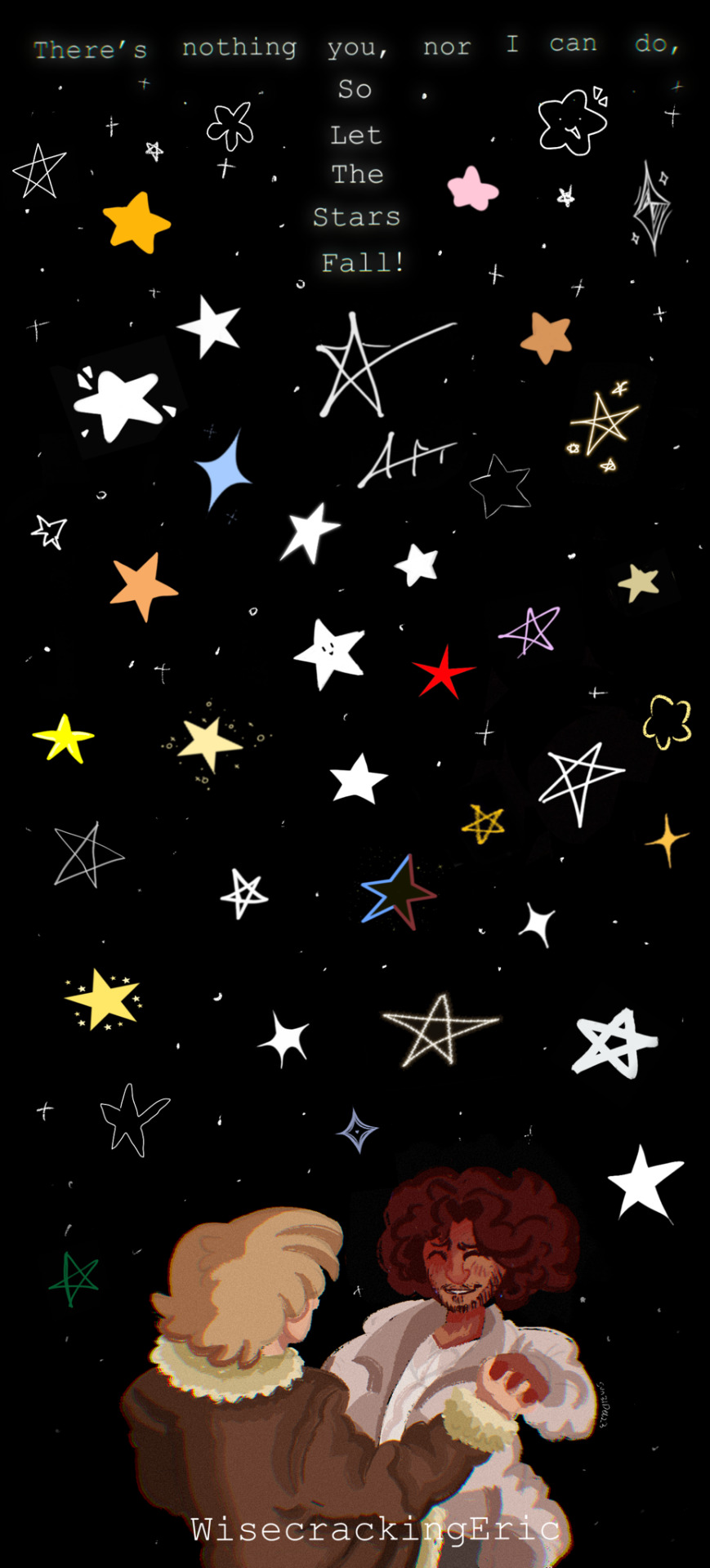
LONG ASS MESSAGE UNDER CUT!!!!!!!!!!!! ITS A MASSIVE THANK YOU TO EVERYONE!!! I’ll tag everyone whose made a star for this drawing in the replies- if I’ve missed anyone or if you wanna be added, PLEASE LET KNOW!!!!!!!
At the time of writing this, there’s about 40 minutes let of 2023, and I’m VERY DETERMINED to get this posted before 2024 so I am in a bit of a rush so alas, this may not be as well-written as I’d like it to be but that’s the price I must pay alas HDNEHENEJDN
I wanna start this by saying I’ve always had a lot of anxieties surrounding the New Years, and things changing- even just seeing posts that were from the year prior always seems to give me anxiety. Things change, people move on, while I stay with the same interests- it’s always been something I’ve struggled with, but making this has helped me come to terms with all of that and I’m glad.
Theres no better words I can say right now other than; Thank You. Thank you so, so, SO much to my friends, both new and old- my friends who’ve been here since the very beginning and have stuck by me through this whole rollercoaster- and to all of my new friends, who it sometimes feels like I’ve known you all for at LEAST five years and not like, five months or something HDBWHNWUDNDHDJS thank you to everyone who has ever been kind to me, supported me and enjoyed what I’ve created- I’ve recieved probably the kindest words I’ve ever heard in my entire life this year. Thank you to the people who stuck by me when times got tough and helped me through my own seemingly very insignificant or silly problems HDNEJENSK
This year has easily been one of the best years of my life. 2022, to keep it short, was awful- I came out as a Transgender gay man to my parents and it went awful. I was dealing with the worst mental health of my entire life and there were times it felt like there was no hope. On top of all of that, my childhood dog passed away- so all and all, I wasn’t looking forward to the future. But my loving partner introduced me to Resident Evil, and as a result the community as a whole- and to say it changed my life would be an understatement.
I know it’s obviously no secret that I have a favourite character, Luis Serra Navarro- but to say his character has changed me as a person for the better would also be a MASSIVE understatement. I’ve never ever in my entire life resonated with a character so profoundly before- as a queer and trans man, I saw myself reflected in his performance, and that means more to me than words can even describe. His character encapsulated me in a way no other has done before, and genuinely helped me accept my autism, my queerness and my trans identity as a good thing- I could write absolutely ESSAYS on his character and I have. I’ve consumed more Don Quixote media than I think I ever would have otherwise HDNEHENEJD and to say I’ve genuinely become a more confident and happier person because of his character would, again, be SUCH an understatement. It’s truly hard to describe how much he means to me, but I hope my words give a good idea.
For the first time in a very, very long time, I get to look forward to my future. I don’t see my Queerness or my Trans identity as a setback anymore; I have things to look forward to, plans I’ve made and a future I can look towards. And I cannot thank my friends- all of you know who you are- André and Andrea and everyone in my life and this small little community I’ve unintentionally formed for giving me that opportunity. Words will never be able to describe how grateful I truly am, but I hope this is close enough.
Thank you for letting me fully indulge in my autism and enjoy Luis’ character to the fullest. I’ve never felt happier enjoying something in my entire life.
Thank you everyone. For everything. May you all successfully defeat your own windmills <3
#ericsart#resident evil#serennedy#luis serra#luis sera#leon kennedy#leon s kennedy#serrenedy#serrennedy#luis serra navarro#luis sera navarro#luis sera fanart#luis serra fanart#leon kennedy fanart#leon s kennedy fanart#resident evil fanart#rebhfun#re fanart#re4r fanart#resident evil 4 fanart#re4r luis#re4r leon#re4 fanart#luis sera x leon kennedy#luis serra x leon kennedy#leon kennedy x luis serra#don quixote#don quijote#serennedy fanart#re4 luis
190 notes
·
View notes
Text
I remember people were discussing if twst is not about the biblical seven deadly sins, but about the seven social sins. Well, look and behold, each chapter does represent the social sins. Note that not all of them are comitted by the g7 incarnate of the chapter themselves, but do lead to their overblot somehow.
Chapter 1: Politic without Principle
Riddle actively reminds people his policy of the absolute-ness of the law, that the law, even on the smallest detail, must not be crossed. However, Riddle lacks a principe he have for himself, for his strict lawful policy was something his mother taught him, but not what he learn for himself.
Chapter 2: Pleasure Without Conscience
Leona enjoys power greatly, be it about his power of being a prince, or as a dorm head, with little to no regard to his responsibility, overusing power with no caring of the drawback. And when Lilia reminding him about that conscience, he overblots.
Chapter 3: Commerce Without Morality
Pretty explanatory, we know Azul makes his trades without feeling any sorry for his victim and gives so little about moral, that ends up backfires on him that , he can keep absorbing other powers, just, the container is too small and it makes him go overblot.
Chapter 4: Wealth Without Work:
Now, the sin itself is done by Kalim in which it led to Jamil overblot. Kalim does minimally for all of his clan's wealth that includes Jamil's family as their servants for generations, that he seemingly can get so many with so little work, and this makes Jamil envies Kalim so much.
Chapter 5: Worship without sacrifice.
Another chapter where the sin is done not by the overblot. Rook, in his worship of beauty, refuses to call out vil even once until he overblot for he enjoys the beauty of vil's mental breakdown (he actually spelled it out himself) , and neither did he make it clear which he will chose, neige or vil, not wanting to lose either of them.
Chapter 6: Science Without Humanity
Again this chapter is pretty self explanatory, Idia certainly create the new Ortho with little to no regard to humanity, and even then, as much he supplies Ortho with his hardware, he often unintentionally ignors Ortho's humane, emotional needs like going out with him.
chapter 7: knowledge without character.
Malleus, being a fae, possessed more knowledge about magic than the entire mortal civilization, with no mature character to properly manage said knowledge (and his immense raw power to actually do the magic to boot) , that emotionally, he is but a child throwing tanturms when things didn't go his way, but with all the knowledge and power to twist (heh) the world to his desires.
#disney twisted wonderland#twisted wonderland#riddle roseharts#leona kingscholar#azul ashengrotto#kalim al asim#jamil viper#rook hunt#vil schoenheit#idia shroud#ortho shroud#malleus draconia
569 notes
·
View notes
Text
Hey, Paintbrush here!
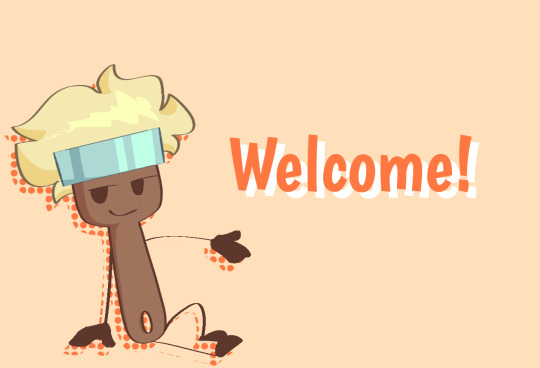
Recently noticed that a few others at Hotel OJ have made some tumblr blogs, so I decided to as well! Welcome to my blog, all :)
I'm Paintbrush (they/them) and I've competed on three seasons of Inanimate Insanity! Season three just ended and I've just been chilling at Hotel OJ for a while. Not doing much else, so I'll probably be answering asks frequently.
DISCLAIMER: this ask blog has (unintentionally) become an au
if you want to get the full context, feel free to scroll down certain lore tags or check out the archive! -mod
Tags of interest:
#painty yapping: Paintbrush answering asks, sometimes used for reblog convos
#painty posting: explained here!
#misc asks: Asks that don't particularly have anything to do with a plot line
#bristle blather: Asks or convos specifically related to Paintbrush's bristles
#burnt-out brush: Posts where Paintbrush aint doing so hot... also includes the mini arc where Painty ran away and Backgroundy temporarily took over answering
#magic anon: Temporary events that can be applied on the blog
#rough sketch duo: Posts that feature both Paintbrush and Animatic (from Animatic Battle), Animatic usually played by @animaticaskblog
#backgroundy: A character introduced through a magic anon event, backgroundy is a friendly face on the wall that occasionally shows up on this blog. ....or are they? friendly i mean. backgroundy clearly has a lot to hide, and becomes quite defensive upon being asked about their past
#torch/inner flame: angry paintbrush? wrong! a completely separate character!! torch is a secretive and smooth-talking individual that possesses paintbrush at seemingly random times. also narrates paintbrush's actions
#flooding memories chronicles: Posts taking a dive into Backgroundy's obscure past!
#rediscovering fire chronicles: Paintbrush has an inner flame now. WHAT!!! oh just kidding theyre just possessed. hi torch!! whats your backstory?
#false contract chronicles: AAAAAA SPRINGYS HERE HES GONNA HIRE US ALL AAAA
#painty yapping and yapping: posts where Paintbrush rambles for an extended amount of time, usually not dialogue
#animaticified saga: paintbrush gets ab animaticified. that's it
#art imitates life chronicles: paintbrushs past wasnt ALL sunshine and rainbows... if only they knew what happened!
#backfire arc: paintbrush makes a terrible no good absolutely horrible bad decision. they suffer the consequences accordingly!
#still waters runs deep chronicles: torch and backgroundy FINALLY talk things over like civilized adults
#history repeats itself chronicles: another life has been created via m!a,,,, waow
#mod kit: Posts from the mod! me!!
hey, mod here! (vortex, he/they/she)
there are a few things id like to mention:
this is my first ask blog. in the history of EVER!! so pls be patient with me
dont plan on including ships on this blog! but i dont mind ship-related asks ¯\_(ツ)_/¯ please just dont be weird or mention proships
like i said, dont be weird in the asks! please no nsfw or fetish-y asks either
dont be an asshole pretty please- i dont mind jokes and sarcasm but if ur only here to be a haterade pls leave 🥺
yall can do magic anons if you want! please try not to send too many tho 😁
i made the paintbrush asset myself! pls dont use it or steal it :')
i may not answer asks immediately so please be patient and dont spam or pressure me into answering! i may ignore and refuse to answer any asks if im uncomfortable as well
keep in mind some of what i say may be personal headcanons or made up on the spot! ill stick to canon as much as possible but if theres an opportunity to add a headcanon, ill likely do so
thanks for reading!
#inanimate insanity invitational#inanimate insanity#ii#ii2#ii3#paintbrush ii#ii paintbrush#paintbrush inanimate insanity#inanimate insanity paintbrush#not an ask#painty yapping#mod kit
61 notes
·
View notes
Text
What's so cool about the way UT aus evolved
For many years I would draw and sketch and stuff. Not all of it was spectacular, but it wasn't bad. Yet, at some point or another I would end up ripping the drawing up or throwing it away. It was never out of malicious intent. I just did it. I don't know why either; it wasn't like I disliked the drawings.
So, I discovered the insanely large and depth-y fandom of Undertale. Pretty soon, I started reading about the star sanses and bad sanses. I put a lot of effort into figuring out the canon (fanon since none of it was canon???) truths about the characters and what was fanon (like what Blue's deal actually was). As I was reading comics I came across a alternate multiverse where Error was a chaotic child and Ink was a tired dad. In the comic (I wish I could remember what it was called so I can credit the artist) Error makes friends with these shadow creatures. They lead him to help destroy an au that the artist seemingly wanted gone. Ink later finds/kidnaps him and brings him home. Ink explains that many creators, for whatever reason, want to destroy their work. But in the long run, it's not what they want. He says that everything, no matter how "bad" it is deserves to exist. Just so someone knows it's there. Even if it isn't shared with the world, that doesn't matter.
After reading that comic I thought about Ink. He's a soulless creature seeking to feel things by feeding off the beautiful work creators and him make. I think, perhaps unintentionally perhaps intentionally, Ink is a metaphor for artists and creators (the non-canon kind). We seek validation or happiness or even any emotion from the things we and others create. We could be having trouble with finding our own emotions outside of the internet. It's okay to need to escape our lives for a little bit. It's not a bad thing if you have an idea to share at all. Helping others feel better is good too. But just like Ink we have to be careful not to let it consume our lives. We can't let fandoms be the only way we can feel. We have to generate emotion in other areas of our lives as well. We have to make sure our community isn't only online. We have to make sure that what we say online is safe, and that we are not unintentionally exposing ourselves to dangerous people.
Next, I addressed Error. He too, can be a metaphor. He reflects the opposite side of the spectrum. He is has been so hurt in the past, even if he doesn't understand how, that he feels the need to hurt others. He could be compared to a hater, but I don't like that term. Hurt people hurt people, and while that doesn't make internet hate okay or justified by any means, it can offer and explanation. People who say mean things about art (actually mean and baseless things, not voicing an opinion) are probably seeking attention. The want to fight with you because the consequences don't seem real. You have no idea what's going on in their lives, just like they don't know you. When they seek that attention, don't give it. Walk away in the metaphorical internet sense. If you need to, block them. But don't fight hate with hate. It never works. We have to love the people who hurt us or it's no use in saying we aren't like them. If you remember saying something mean on the internet, I'm sorry for you. Even if you don't believe it, there are people who love you. So, so many people.
Neither of these characters were created for this purpose. They weren't even meant to go together. But still they make a beautiful world for everyone to enjoy. So whether you are an artist or a reader, an Error or an Ink, whether you are like me or not, we built this sorta by accident, so let's appreciate how cool it is.
#undertale#error sans#error!sans#ink sans#ink!sans#undertale au#ut au#undertale multiverse#faunathoughts
38 notes
·
View notes
Text
Wow these recent episodes are really making me realize that fionna, cake, and simon are really leaving a trail of destruction in their wake. In the first world they went to Finn died. In the second, Simon died. In the third, Bonnie and Marcie are implied to have killed each other. In the last, BMO died. In each of these cases, a diverging moment around simon in the past created these fucked up apocalypse worlds and in each of them the current crew caused our favs to die. It also seems to show the worst versions of each of the characters in their respective worlds which leads to the fucked worlds too.
World by world analysis below:
Ice finn world - Simon sacrifices himself to stop the nuclear bomb which kills him and Marcie is stuck guarding his body. Finn goes to desperate lengths to protect his family (his flaw of self sacrificial heroism at any cost) and wears the crown. When current crew visits the world, Finn has moved on (due to Prismo/Finn/Jake using the Maid to get rid of the crown). However because of their search for the crown, they cause him and the Destiny gang to go head to head and for the scarab to kill him.
Snow King world - Simon/Ice King decides to put his madness onto Bonnie. This is ice king at his worst, losing all of the old simon and prioritizing himself above anyone else. When the current crew visits the world and tries to get the crown, they literally kill simon and all of the ice people and candy citizens.
Vampire world - Simon never finds Marcy or the crown. Marcy is fully seemingly apathetic to others and never really makes deeper bonds, refusing to get close. Bonnie becomes hardened and treats anyone on her team as disposable for her end goal. Both of them have their flaws to their extremes. When the current crew visits, they cause Bonnie to finally storm the castle which forces Bonnie and Marcy to stop solely homoerotic back and forth fighting and rather go all out, seemingly to kill each other.
Jerry/Litch world - Simon/Ice King left his crown in the drum. Purely hypothesis but its possible that because of this no one had the power to put a stop to the Litch, as they didn’t have all the gems. BMO is all alone, with everyone dead. He says he hasn’t seen football, which is incredibly tragic, showing that he’s also lost part of himself. The crew showing up and searching for the crown causes BMO to sacrifice himself to jump start the remote (completely unnecessarily I might add! Damn Fionna you did him dirty by not owning up to having it). This is BMO’s flaw in action as he goes to sacrificial lengths to make the others around him happy, a bit of a Hero complex as well, but mostly just wanting everyone to be okay. As the heart of the show, he usually always stays positive, but here he gives in.
This is wonderfully done by the writers of the show. I feel like this shows a number of points - the impact of an unsanctioned world and the damage Fionna/Cake can cause unintentionally, how with all of his regrets our current Simon still needed to follow this path for everything to be alright in the main world, how even though Fionna and Simon believe they’ve been dealt a bad hand and want to escape there’s actually still a lot of value in their world and its still worth trying, and what all of our favorite main characters could be at their worst but have worked on together to be better versions of themselves. It’s super interesting to see all these dynamics explored!! And very tragic honestly.
35 notes
·
View notes
Text
First things first: both Asuka and Shu are really bad communicators but for very, very different reasons and it creates a very interesting dynamic that is hurting both of them right now and I find it fascinating but also a bit frustrating.
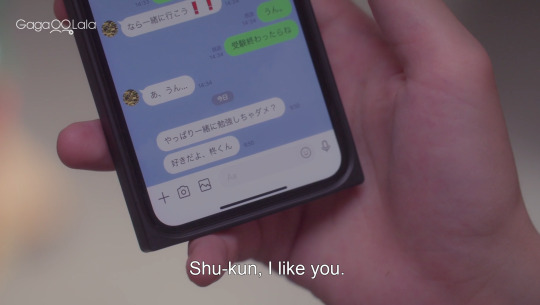
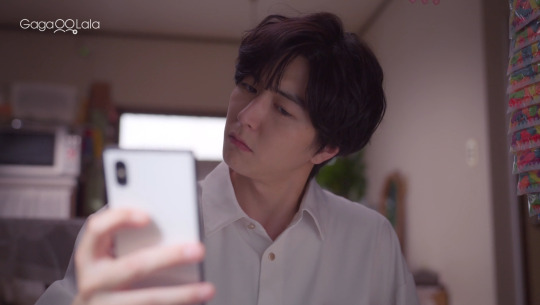
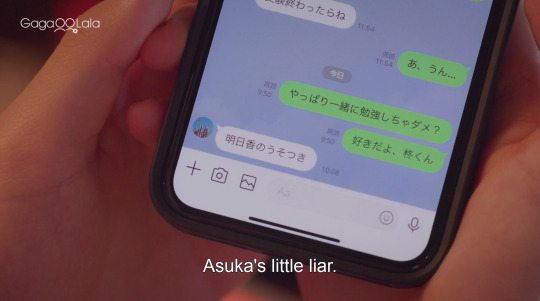
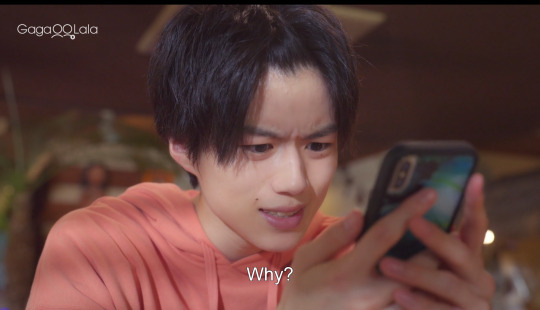
Shu, having seen Asuka's little plan with his friend, is now sure he's being cheated on and is working off that assumption in his communications with Asuka while Asuka has no idea what he saw and thus no way of knowing why he's getting this reaction.
Asuka is just very bad at communicating. He's disorganized, tends to react very quickly and without thinking and, when he realizes he needs to think about his actions and words, tends to overthink to the point of inaction. He is impulsive and quick both to be rude and to apologize but he misses the moment so often because he's caught up in his emotions.
Shu is bad at recognizing his own emotions but also at any form of open sharing. He tends to speak in metaphors and assume that the people around him think the same as he does and will understand what he means even when he says something that only barely implies it. He tried to show his love for Asuka by insisting he study alone not knowing how much that hurt him and now he's in a situation where he thinks he's being cheated on and cannot even begin to find the words that aren't a complicated metaphor about architecture.
A brash and quick young man who switches between rude and desperately apologetic and an older man who speaks in metaphors and indirectly because he believes that everyone understands his meaning is... rough. And we've been seeing that all along. Shu might typically understand more of what Asuka is saying because he's more direct but it also means that he takes that directness in a way Asuka doesn't mean.
They are constantly unintentionally hurting each other because they're not speaking each other's languages.
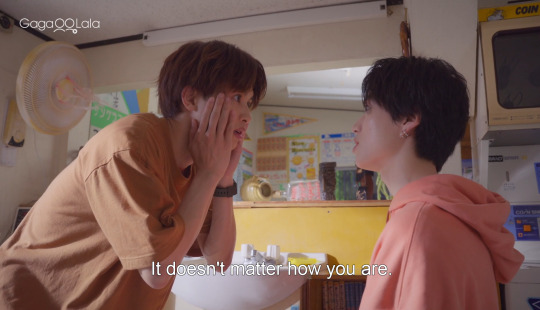
I love Asuka and Minato's friendship because they're both less mature characters in relationships with someone with very different communication and love language than they have and they are direct contrasts to each other in that regard. They both lash out, making assumptions and try to act on them and unintentionally hurt the person they love through either action or inaction.
Asuka lashes out and Minato takes everything said or done very seriously and neither of them knows how to handle it any other way.
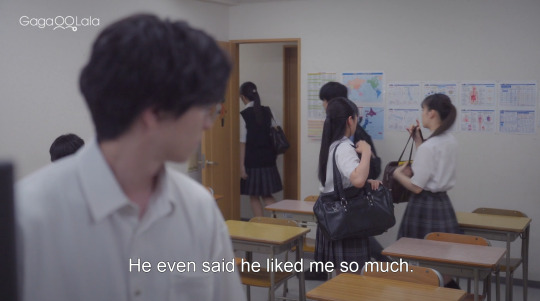
This is an interesting scene because Shu overhears two students talking about a cheating boyfriend and relates it to his own situation and it makes sense because, yes, that's the assumption you make when you see your boyfriend say he's going out with a girl. So, of course he's decided that Asuka was cheating on him. But we, as an audience, know that that this is an impossibility and not what happened.
But we also know how much Shu withholds from Asuka in their relationships under the idea of how he loves. He pulls away from their date because Asuka doesn't reach their agreed goal, he leaves their studying because Asuka wants to hold his hand and gets distracted. Shu cares for Asuka but his way of showing love is also actively hurting Asuka. Asuka momentarily faked a relationship to support a friend and that hurt Shun but we've also seen how lonely Asuka has been within this relationship.
Honestly, it's fascinating to me to see how upset Shu is by this without being able to express himself or seemingly to truly recognize what he feels.
The only direct communicator in this show is Shin.
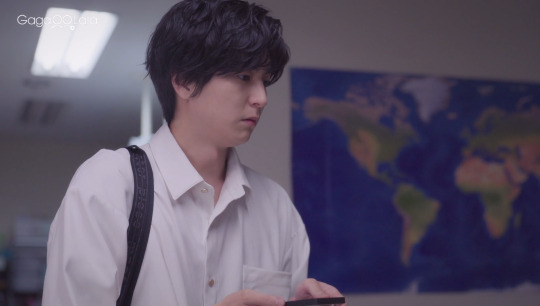
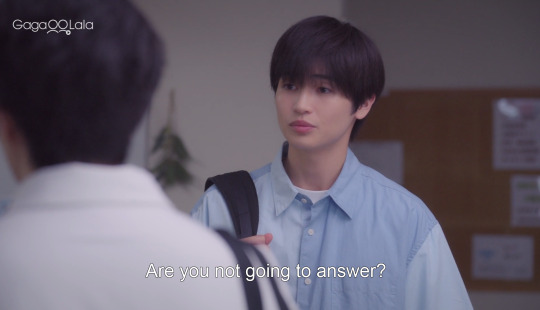

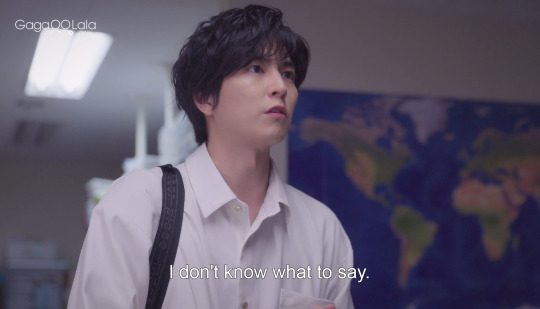
Let's just call back to Asuka saying the exact same thing to Shin about his relationship with Shu a few episodes ago! Well, not the exact same thing but the same idea of not knowing what to say or how to talk about it.
Shin is the only person who regularly talks to both sides of this relationship but he doesn't know enough to give any real advice to either of them nor is he interested in that. While Asuka often finds himself giving advice and asking for advice, Shin doesn't tend to ask as much because he's mostly uninterested in anyone besides Minato, frankly.
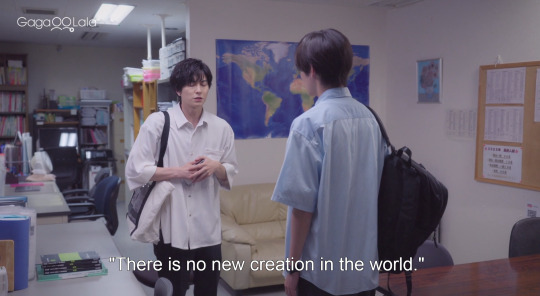
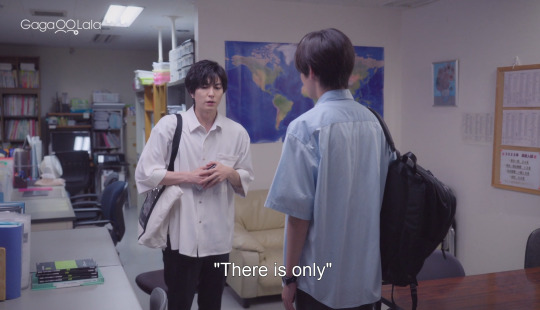
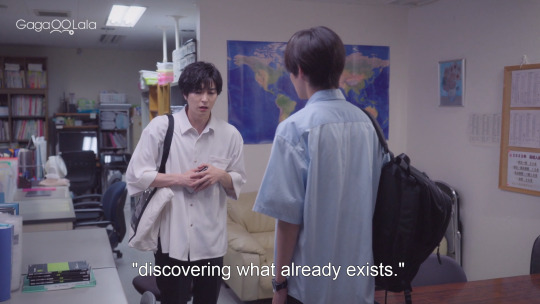
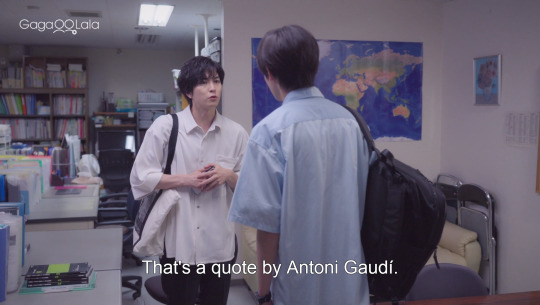
Shu does not communicate directly. He does not say things like 'I was cheated on and I'm hurt and I don't know what to do'. He quotes an architect because he overheard his students talking about a similar situation and it reminded him that these things happen but also that they hurt and he doesn't know how else to show that pain.
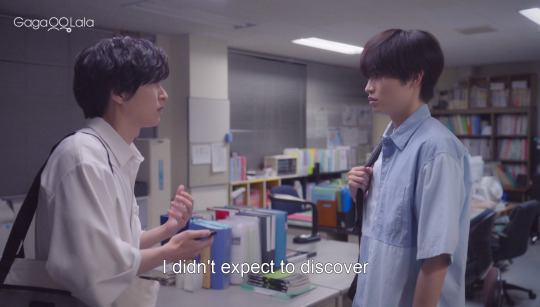
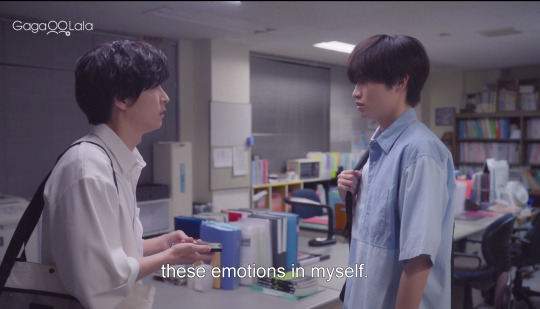
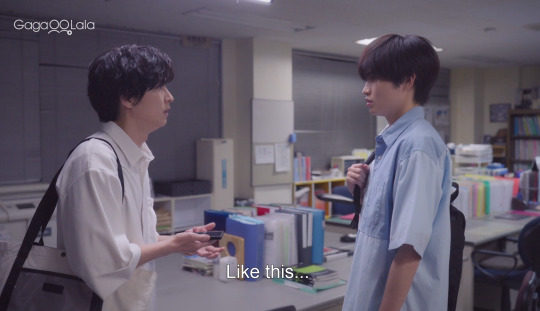
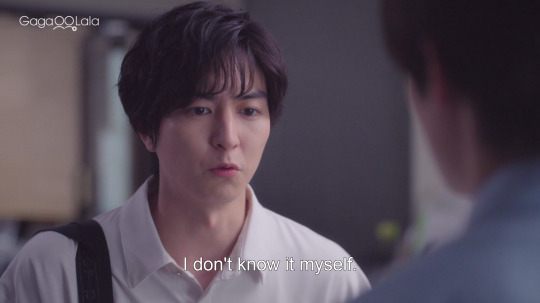
Shu, who is the one who entered this relationship because Asuka said he wanted to be at his side. Shu, who was the one who held that their original relationship was entirely fake because for him it was. And now he's suddenly found himself hurt and aching and wondering what's going on because he does care about Asuka and he wants this relationship and he doesn't understand what's going on or why he's reacting so strongly or how to describe it at all.
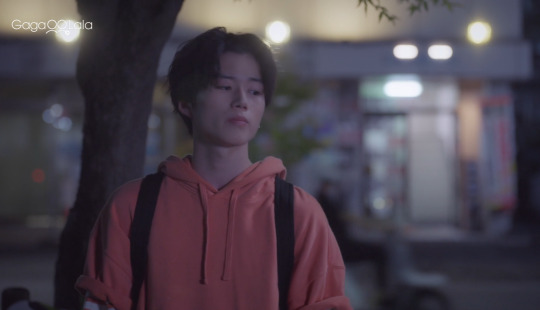
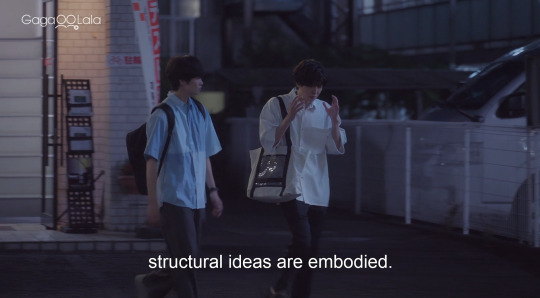
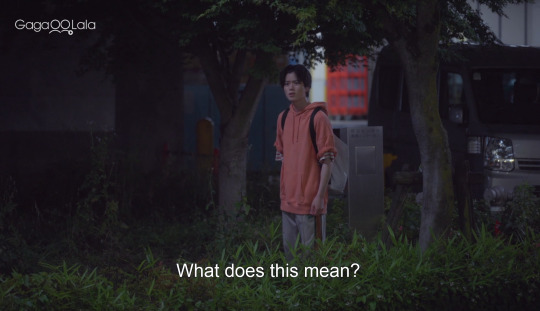
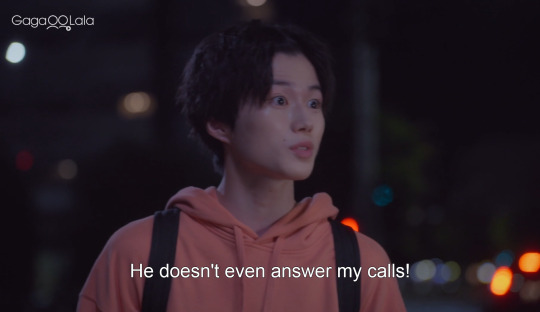

And then Asuka waiting for Shu because he won't answer his phone or his texts, standing outside his work and waiting but then unable to do anything because Shu's attempts to explain his upset come across the same as his enthusiasm.
(Also, Shu is specifically talking about the Sagrada Familia which is an unfinished Catholic church that the aforementioned architect worked on and I know nothing about any of that but I do find it interesting that the work is specifically unfinished just like their relationship is still under construction.)
But this is just more of their specific brand of miscommunication, in which they each misread the other person's emotional state or needs in the moment and then never take the chance or get the chance to clarify because they leave before the question can be asked.
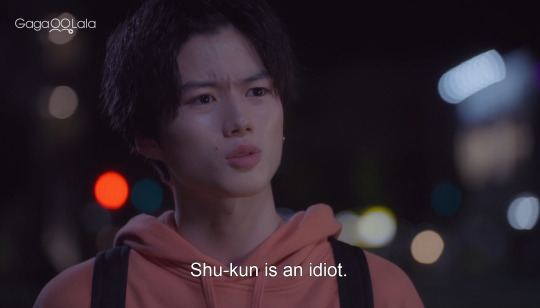
Darling, you're both idiots.
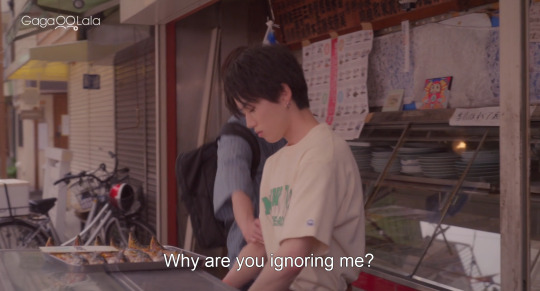
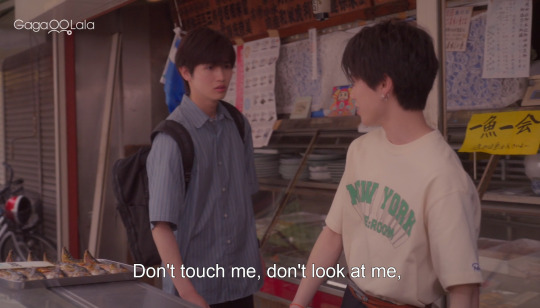
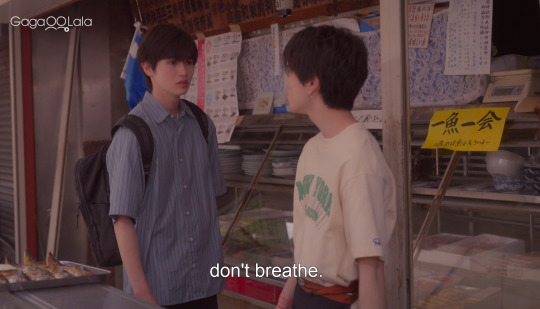
This is the first time that Asuka has been the one to pull away from Shin. Normally he's the one running up to him and grabbing him but this time Shin approaches and he pulls away. He saw Shu and Shin together the night before and now he's trying not to be hurt or to express that hurt.
Asuka is friends with Shin but he also knows that Shin is his very reluctant friend. Both Shu and Asuka need advice on their relationship but neither of them knows how to ask or even, frankly, what to ask in order to figure that out. Asuka lashes out at Shin in this moment because he is hurt by Shun but especially hurt by seeing Shu talking to Shin when he refuses to speak to him.
There is a wall between Asuka and Shu and it is formed by their communication skils or lack thereof.
It is good to see that Asuka chases Shin and tells him about the moment with Minato. He cares about his friends, he really do, but he doesn't handle his emotions calmly or in a straightforward way. He might have told Shin about his conversation with Minato but I bet he didn't bring up Shu.
Asuka is desperately jealous of the relationships that Shin and Minato have because it is, truly, his dream relationship. For all the isseus inherent there Asuka just wants to be able to love and be loved in his own language. But he is not as straightforward as Shin and Shu is not Minato and until Asuka pushes himself in the relationship he has or decides to change... nothing can happen.
Now, this is going to force something but the question is... what will it force? Asuka doesn't know why Shu has pulled away or is calling him a liar and Shu isn't willing to speak to him. They need to communicate but they don't have any idea what they need to communicate so they can't even begin to get started.
The problem is that the first step in communication is talking thoughtfully and they have tripped at that first hurdle and are currently burying themselves in the mud.
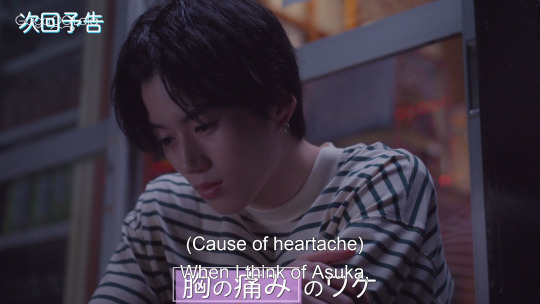

I need to know who Shu is talking to and I am worried about Asuka because he just doesn't cope well with stress and has no idea what's going on because their communication is so bad.
... I just love them, okay? I really do look forward to their eventual actual communication that will likely happen accidentally.
#minato coin laundry 2#minato's laundromat 2#minato shouji coin laundry 2#みなと商事コインランドリー2#bl series#bl drama#asianlgbtqdramas#asian lgbtq dramas#asuka x shu#asuka x hiiragi#hiiragi x asuka#shun x asuka#asuka x shun#shu x asuka#japanesebl#bl japan#japanese drama#jdrama#bl japanese#bl jdrama#japanese bl#japanese series#jseries
35 notes
·
View notes
Note
hello... 5-15 of those asks if you'd like for John (any iteration!) and Nico... hehe
yay 🧡
5. Is there any significance behind their hair color?
not really lol. john's hair is brown because it's the most common hair colour, nico [pascal's object of obsession from 2017 inver] has black hair because i wanted to further visually distinguish him from bowman. both have visible grey streaks because it's an easy way to help define the shape of the hair when drawing it
6. Is there any significance behind their eye color?
yes but only in that they (and all my characters) have brown eyes because i got tired of ppl seemingly on purpose avoiding brown eyes for their interesting characters. so i only make brown-eyed characters on purpose. the only exception is cuinn (harpy) because he has albinism but typical members of his species have dark brown eyes.
7. Is there any significance behind their height?
yes, john is my height on purpose (5'4") and nico is 5'3" because i'd unintentionally made my previous trans man characters pretty tall so i thought well let's make one who is short hashtag representation
8. What (if anything) do you relate to within their character/story?
i relate to john because i'm also a beautiful brunette who sucks so much. nico is unrelatable to me because he's a cop (he's not really but the plot does follow a buddy cop format)
9. Are they based off of you, in some way?
john from long long ago (2011, my first major setting) was a direct self insert thus the similarities in appearance. he has some parts of me in him because he's my main dnd character and it's hard not to project when doing 5 hour improv sessions once a week but he has never been less like me tbh. nico ehhh not really, we don't align personality-wise because i would not tolerate pascal for more than 5 seconds without wanting to hit him with my car
10. If they have an LI, how much of their character is tailored to be compatible to that person?
for john yeah 100%, they were made for each other. the angle i'm going with for their arc is a "perfectly synchronous" relationship being no protection for some bad shit going down between them, showing that if two people are SOO perfectly made for one another, it can often lead to one person taking the other for granted, assuming they can predict how the other person will react in any given situation, and ultimately it all results in a messy breakdown of communication.
for nico i meannnnnnnn he is a horse trainer and pascal is a horse so there is that, but in terms of personality they are intentionally very opposed and clash frequently, get on each other's nerves, fight, and not always smooth over those incidences. they are not very compatible.
11. Did you know what the OC’s sexuality would be at the time of their creation?
yep
12. What have you found to be most difficult about creating art for your OC (any form of art: writing, drawing, edits, etc.)?
I'm going to be real with u I could draw and write John in my sleep. Nico i find difficult to write, I have a hard time finding his voice. The ranger uniform also annoys me.
13. How far past the canon events that take place in their world have you extended their story, if at all?
john as a dnd character has no future whatsoever aside from a planned multiclass, he could fall off a cliff next session and die idk. Nico is one of the few characters i haven't thought much about post-canon, i don't feel like it's relevant.
14. If you had to narrow it down to 2 things that you MUST keep in mind while working with your OC, what would those things be?
john: 1. literally just say the first thing that comes to mind, always. 2. keep em guessing
nico: 1. hes scared of boats and this is surprisingly relevant, i keep forgetting it lol. 2. i try to keep in mind my studies of horse trainers & their work, how they interact with their animals and what subtle body language they might use; these are people who frequently have to convince giant frightened animals that they are in charge here, this translates into how they hold themselves, how they speak, how they approach conflict etc.
15. What is something about your OC can make you laugh?
john's secret fear which we have discussed in dms (iykyk)
nico let himself get tricked into going on a theme park date with pascal while on duty and didn't even realise until afterwards that it was an elaborate setup of fabricated evidence all so that pascal could get him in the tunnel of love
7 notes
·
View notes
Text
Petals May Wilt (But We Can’t Let Them Wither)
The New War is over. The System is saved, for now. Yet, a new challenge arises, the issue of ‘the Lotus’. With her mind fragmented from Ballas’s abuse, can she begin to coexist with the other two voices that now begin to drown out her own?
Natah and Margulis have been awakened into a world that is distinctly unfamiliar. They are not who they once were—in more ways than one. But who is the third voice sharing their mind, and why is she so uncomfortably familiar—for one of them, at least?
Chapter 4: Merciless Strength Is The Only Security
Fury burns within her, finally free of others’ influence. Yet, an obstacle stands between the former Queen and her vow to ensure that nothing ever controls them again.
TW: There are just a couple warnings that I want to address for this chapter before we get into the story.
Non-graphic mentions of the canon-typical abuse, manipulation, and other nonsense that comes with Ballas’s character.
Mentions of (unintentionally) questionable coping habits, particularly neglecting sleeping and eating. You’ll understand a bit better after reading, but Lotus isn’t exactly meaning to do what she’s doing. She’s just kinda…going through the motions right now. Being a Sentient is confusing, and she thinks she’s doing better than she is.
Brief mentions of canon-typical violence.
With everything out of the way, the fic begins under the cut.
Rage is a tool, one she can wield as deftly as a soldier might draw their blade, eager for its metal to taste the blood of their foes. She has harnessed it her entire existence. It has been warped by him, held like a knife, twisting and tearing out the viscera of what she used to be. Her anger was used to slaughter her kin.
Now, Natah’s fury takes the form of vengeance.
It is her right. She deserves that much.
Yet, her body is changed, made weaker by that foolish third voice, who seems to believe that she deserves to take up the mantle of their mind. The third voice that, for all purposes, is little more than an amalgam of Natah and the human memories that currently plague their mind. The being that still wears the, albeit changed, skin that had sealed Natah’s fate those centuries ago. The skin of the quiet voice who hardly interacts with them, who remains further back in their mind, not venturing close unless it is to disagree with them.
Natah does not allow herself to think about how, in that moment, the Lotus had subconsciously changed her appearance to emulate more Sentient traits, not fewer. Her anger—her strength—cannot falter.
The Shepherd must protect them. They can never fall under the claws of another again. The Lotus makes that task infuriatingly difficult. She refuses to allow the Sentient the control that Natah knows that she should have.
She can do what must be done.
The others cannot.
If she were at the helm of their mind, she would not be distracted by the pathetic waves of fear that periodically seep from the Lotus’s thoughts to theirs. How can she call herself a leader, when her decisions are made with emotions teeming behind them? It is an insult to Natah, to everything she was created for.
But, the Lotus remains unconvinced, seemingly. As such, the Sentient watches her every move, waiting for a misstep. She is aware that the other is intimidated by her. Good, that will make it simpler, she reasons with herself. She watches as the being throws their body into its work, as if nothing had happened—though the Shepherd senses that her mind is not as calm as she portrays.
In doing so, Natah notices something crucial.
It is as if the Lotus does not know their limits. Or, perhaps she has forgotten.
Anger coils within her thoughts as she watches the other act as if they are simply immune to the effects of hunger, of exhaustion. She screeches, furious, refusing to allow the Lotus to deplete their strength.
They just clawed their way back to the world of the living. Why does she do this?
“What are you doing? Do you enjoy weakening us?” A jolt of some emotion that she cannot place bleeds into their mind, but the Lotus does not respond. She snaps, realizing that she will not receive a reply.
“You cannot lead them like this.” Their mind flashes with unease, the emotion coiling uncomfortably, seating itself firmly in their thoughts. Natah does not understand what for. She is simply stating a fact. The other has already proven that she seems to value the children above all else. Perhaps this fact will cause her to reflect, to realize that she should step aside. Perhaps she will realize that the best protection for the children that all three of them died for is to embrace Natah’s ferocity.
Of course, logic does not apply to illogical beings.
The silence echoes louder than the frustration burning brightly in her mind. What does this being not understand? They do not need compassion, they need infallible strength. Natah will not wait idly by as others inevitably attempt what he did. She refuses to allow her mind—their mind, she begrudgingly reminds herself—to be invaded again, thoughts gnarled and molded into unrecognizable forms.
She had shown but a single crack in her resolve, and she had died for it.
She will not allow it to happen again.
She cannot.
The Lotus will learn not to hinder her efforts to protect them.
Natah’s resolve hardens, stoking the flames that sear her thoughts.
She was once a soldier, a Shepherd, a Queen. Against that, what could possibly stand in her way?
#warframe#mist’s writing#petals may wilt#warframe fanfiction#warframe spoilers#natah warframe#lotus warframe#Also up on AO3 as always
3 notes
·
View notes
Text
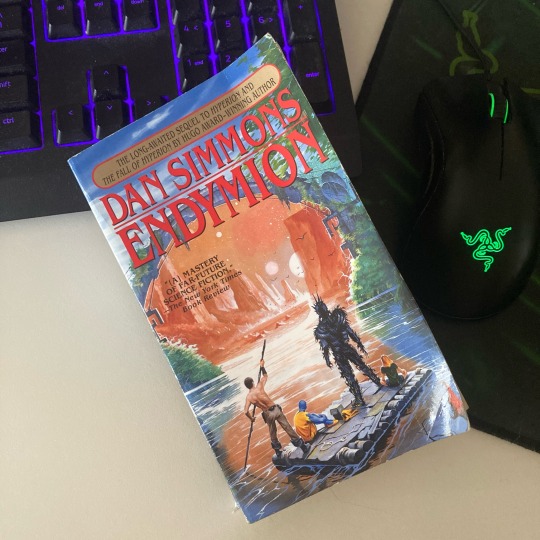
Endymion, by Dan Simmons - 4.2/5
This book surprised the hell out of me. The general consensus online and amongst people I know who have read Hyperion, is that Endymion and The Rise of Endymion are not as good. A majority of people don't even bother reading them. Those people are missing out, and I don't put that lightly. Luckily for me, I bought all 4 books in the Cantos without looking up any ratings or reviews, so my choice became; read all of them, or waste your money. I was hesitant to start this one, and it did honestly have a bit of a rough start, but I was head over heels for it by the mid way point.
Endymion is a masterclass in world building, if nothing else. It takes place 274 years after the fall of the Hegemony, and the destruction of the TechnoCore and it's network of farcaster portals which connected the web worlds with instantaneous travel. Simmons did an amazing job at evolving his universe over this enormous gap in time. Planets became isolated from each other, terraforming projects failed and mother nature returned these worlds back to their natural state, billions died of starvation and war, or simply by getting stuck on the wrong side of a portal after the fall. During this dark age, The Church harvested the cruciform parasites from the labyrinth of Hyperion and harnessed the power of immortality to colonize former web worlds and essentially create their own version of a religious hegemony. The irony here is that despite harvesting the cruciforms which were created by the TechnoCore, the Church admonishes artificial intelligence and has banned the manufacture or use of AI tech. This distrust of AI permeates culture so much that there are even points during the story where the main characters straight up decline vital help or knowledge from the Consul's old ship and comlog device, claiming it's useless and essentially telling it to shut up. A small but humorous detail. With the power of immortality in hand, the Church was also able to create a new kind of space craft which was unconstrained by the limits of the human body's ability to withstand extreme g-forces. These new space crafts could travel anywhere almost just as fast as they could have by using a farcaster portal, with the understanding that the occupants of the craft would die immediately, and be resurrected upon arrival to their destination. It's truly fascinating stuff, and it proves that Simmons' unique and borderline outlandish ideas didn't die with The Fall of Hyperion. He clearly had some juice left in the tank for this one.
The book has some great characters too, just maybe not who you would suspect. The main character, for example, is simply a vessel for us to watch the story unfold. Raul is a typical commoner-thrust-into-heroism type character with seemingly little in the way of personality or flaws, save for a smidge of overconfidence. This is not to say he is unlikeable, he is just a little too perfect and predictable to be interesting. Aenea was not that interesting either, apart from the fact that she is the hybrid child of a human and AI cybrid, who can contact the assumed-dead TechnoCore through her mind and activate old farcaster portals on the River Tethys.
Who are the good characters, you ask? A. Bettik and Father Captain Frederico de Soya. A. Bettik is an android servant who Raul recruited from under the care of Martin Silenus to aid in his quest to protect Aenea. He is cool, calm, collected, largely impassive, and sports an unintentionally humorous deadpan delivery. Despite his cold android personality, I was constantly surprised by his displays of courage and humanity. He was the rock that held the group together, and I honestly almost cried when he lost his arm and almost died near the end of the book. Father de Soya on the other hand is the Pax officer and Catholic priest who is tasked with capturing Aenea. Throughout the journey, he displays surprising complexity as he undergoes a hundred deaths and resurrections that slowly drives him mad. Despite being solely responsible for Aenea's capture, de Soya is not the bad guy. Yes, he is faithful and obedient to the Church, but he's also smart enough to know when the truth is being manipulated, and can make decisions based on his own judgement. He ends up being possibly the best written character in the entire series.
The main story arc of Endymion is essentially just an interplanetary manhunt. It's a much simpler and more linear tale than Hyperion, but I'd argue that it's also more fun. Being taken on a wild ride down the River Tethys, revisiting all of these planets and finding out how much they have changed since The Fall, all the while being relentlessly pursued by someone who is dying over and over and over again to fulfill his duty to the Church... it's all so fascinating and exciting. By the time I was 3/4 of the way through the book, I was finishing every single chapter with an audible string of "holy shit, oh my god, what the fuck". If you have read the two Hyperion books and were unsure of whether or not Endymion is worth your time, I promise you it is. If you love the world that Simmons created, then there is more than enough here to satisfy your thirst. Time for me to jump into the finale.
4 notes
·
View notes
Text
Snowscape Delphi
[Note: Ratchet talks to cyberformed Cinnabar] Ratchet x bot oc [Word Count: 296] [Setting: There's a harsh snowy planet that has a large built facility. It's a medical hospital inhabited by cybertronians. - However there's something strange about the new patient that was found in the snow. After recovering. They tried escaping. In the freedom outside they are confronted by the medic Ratchet and they must confront their own past yet again.] The strange seeker's white eyes were speckled with light abrasion marks from rubbing their tears away. The absence of the sun drew in a cold wind in the growing dark of the night. The planet's frosty air prickled and shook the already shaking seeker. The feeling of hands stiff from the freezing of her own smeared tears. Which had seeped into the joints of their servos. "Ratchet. I don’t have the drive in me. I know others wish the best and want me to go places. And they’ve done things for me. But they’ve also hurt me… I freeze up. And yet I still think in the end everything will be ok. Because I’m hard to kill. That is my standard. My standard is that I know I will survive. Because I have survived before. That as long as I can have a roof over my head and talk and some how impress. That everything will work out. That I won’t be hurt and I will be safe. I am hard to kill. What standard is that? The standard lead by someone who scared and has no trust." "Maybe the people that created you weren’t the best. But you know you could find something more out there if you’d reach a little further for it. I hear that you are struggling, but you’ve got to learn to commit. Take the time to actively learn the meaning of commitment. You’ll exhaust yourself and gain little constantly running off of fumes and waiting on others do things for you. You need to hear this. Just know I support your efforts in wanting to grow. There has NEVER been anything wrong with wanting that. Even in the seemingly endless face of failure. It is important. Ok. Reach a little further."
------------------------------------------------------------------ Note: Purple shows Decepticon traits and alignment. Red shows Autobot traits and alignment. Cinnabar isn't a Decepticon but because of their past they unintentionally talk like one. Fortunately Ratchet's Autobot nature shines through in this character interaction.
#transformers#tf#oc#cinnabar#creative writing#maccadam#oc cinnabar#tf oc#transformers idw#angst#tf idw#motivational#motivational speech#comfort fic#issues#descriptive writing#snow#cold#ice#snow planet#space#fan fiction#transformers fan fiction#ratchet#ratchet x bot#character interaction#mental load#mental health#mental support#kind words
5 notes
·
View notes
Text
Before the Coffee Gets Cold: Tales from the café by Toshikazu Kawaguchi
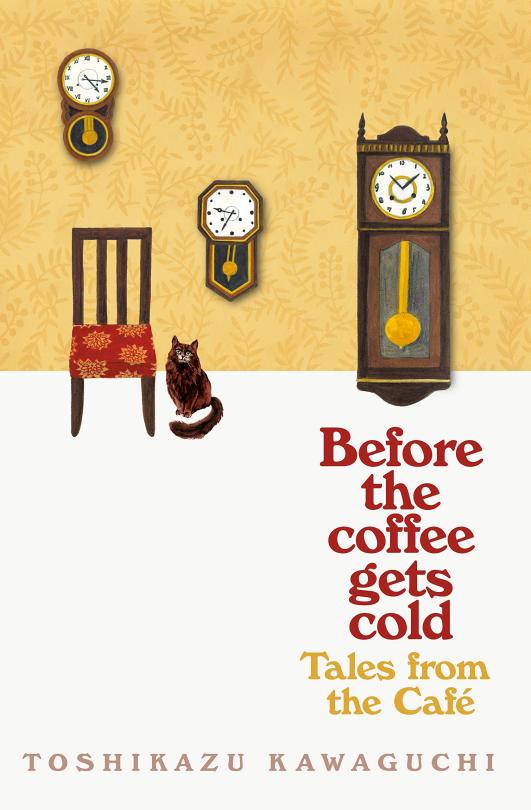
"We can never truly see into the hearts of others. When people get lost in their own worries, they can be blind to the feelings of those most important to them."
I picked up the second book. Unintentionally. Not my fault, ok. I was just picking up book from Islamia Library and I thought I do need a short story book so I picked this one up. Without realizing that the first book was right next to it. Silly me, but anyways.
Funiculi Funicula, a coffee shop in Tokyo, one can travel back in time once served coffee by one of the girls of the Tokita family. There are a few rules including: 1. the person you're about to meet should've visited the cafe at least once, 2. you cannot change the present no matter how you try or what you try, 3. you must sit in the one chair assigned to travelers and you cannot leave it once you're in the past or future and 4. you must finish the coffee before it gets cold. Forgive me if I missed any.
The following rules bring up a lot of questions and the most significant one in my mind was that "can I simply not take something like a heater to keep it warm?" and the book simply replies no you cannot. Which is fine, because it's a magical realism book and I do not wanna question the laws of time travel behind it. The rules provide us with a beautiful sequence of short stories that probably can be read as standalones. I'm not saying this because I bought the second book first don't look at me.
While it can be read as standalones, the cast of the cafe owners and workers remain the same and I think they are a good addition to this long series of books. It provides you with a familiarity, that each time you pick a new book, there are people you can recognize, there are people to return to. Which is why book series work so great, that feeling of familiarity. The recurring faces of the cafe are Nagare, his daughter, the absolutely adorable Miki and the heavy hearted Kazu, who we sympathize greatly at the end of this book.
I'll take this moment to talk about my favourite character, Miki. The six year old girl turning seven in the final half of the book, who made me smile tremendously every time she entered the room. She sometimes becomes French, changes her attitude towards other in a way a child would when they learn new things, and she is filled with impatience and hope to be the next pourer of the coffee, to let people go to the past. She probably just wants to feel important and that's just so innocently childlike that I cannot help the urge to just be in her company. Here is a series of dialogues between her and her father, Nagare, regarding the first time she pours coffee. She thrives in the at her moment of "my time has come". I found it so funny so I cannot help but share it:
"Is it you, monsieur, who wants to return to the past?" "Miki, please, speak proper Japanese," said Nagare, aghast at her attitude. But Miki tsk-tsked him with a wave of her finger. "That is not possible, moi (nobody knows why she calls herself moi) is not Japanese," she retorted. Nagare gave an exaggerated frown as if he had been expecting such a response. "Oh, what a shame! It is a rule of the cafe that the person who pours the coffee must be Japanese." "ONLY KIDDING. I'm Japanese."
I laughed out loud at a moment in a book, and it's just great how my imagination could make this scene so funny to me. And Toshikazu Kawaguchi surprised me with his remarks about the contrast of Miki and the seemingly cold Kazu. The line was: "If people had auras whose colors were somehow visible, there is no doubt that Kazu would be surrounded by pale aqua, while Miki's would be orange."
A flutter of emotions and memories grasp my mind and I'm reminded of how much I love the color orange.
Will buy the rest of the books cause I love having something casual to read and just enjoy myself. Short stories are great in the busy world I created for myself. 7/10, I'll probably look for the first and third book soon.
#review#book review#japanese books#toshikazu kawaguchi#Before the coffee gets cold#tales from the cafe#thoughts
3 notes
·
View notes
Text
Critical Film Analysis: Middle of Nowhere(2012)

Ava DuVernay’s second film, Middle of Nowhere, follows Ruby, who puts her life on hold as her husband Derek is incarcerated. She is seemingly friendless, living alone in a dimly lit apartment with occasional visits from her mother, sister, and nephew. She has single-mindedly dedicated herself to her husband for four years of his eight year sentence, while unintentionally abandoning herself. She gives up her dreams of going to medical school, and works the most unpleasant shifts as a nurse to balance seeing him. When Derek is up for parole at the midway point of his sentence, Ruby learns of his infidelity and the violent encounter that caused his parole to be denied. She realizes then that she has to navigate the fine line between loyalty and self sacrifice, wondering at what point maintaining her marriage might just be foolish. When her bus driver, Brian, begins to show interest in her, she is further swayed towards creating a new life for herself.
The film explores the past, present, and future identities of Ruby through the critical theoretical approach of gender and sexuality. All of the film’s main characters are Black, with a Black woman being the protagonist. Perhaps as a result of being directed by a Black woman, the film overtly challenges stereotypical depictions of Black women. In her essay, “Oppositional Gaze: Black Female Spectators”, bell hooks argues that the oppositional gaze is a critical framework through which Black women resist the dominant, often negative, images of themselves perpetuated by mainstream media.The essay emphasizes the importance of Black female spectators actively interpreting and critiquing media representations, highlighting how the oppositional gaze could be used to reclaim agency and subvert stereotypes– the act of looking itself can become a site of resistance. hooks writes, “We do more than resist. We create alternative texts that are not solely reactions. As critical spectators, black women participate in a broad range of looking relations, contest, resist, revision, interrogate, and invent on multiple levels”. Middle of Nowhere creates a story centering a Black woman’s life through the oppositional gaze. It is not a reaction to other bodies of work, rather an independent look into the life of an individual Black woman without relying on stereotypes or preexisting narratives to further the story. Although Derek is the driving force behind the plot, the audience knows little of his background or the reason he is in prison. The film isn’t about him; rather, it shows how his sentence infiltrates every aspect of Ruby’s present and future as a catalyst for her growth and change.
The film not only focuses on romantic relationships, but also delves into familial connections. Ruby’s mother, Ruth, is particularly distressed by her daughter’s choices, believing that Ruby is holding onto a failing marriage at the expense of her future. During a family dinner with Ruby, her sister, nephew, and Ruth, Ruth yells at Ruby to speak up for herself, repeating the phrase, “just say something”. The film emphasizes the impact of incarceration on the partners and relatives of prisoners, illustrating how they too can feel imprisoned. Ruby intensifies this sentiment by dismissing any suggestion that Derek might face a prolonged sentence as a result of his own actions, and that he may not be advocating for himself effectively. She adamantly rejects any indication from her sister, mother, and even herself that suggest that she might need something beyond waiting indefinitely for Derek, even if it involves abandoning other paths forward or opportunities for fuller self-realization.
The film has no definite ending, but does display Ruby’s transformation from a passive character to an active participant in her life. In her essay, “Visual Pleasure and Narrative Cinema”, Laura Mulvey introduces the idea of the "male gaze," suggesting that both the camera and the narrative reinforce a voyeuristic and fetishistic perspective that objectifies female characters. Mulvey examines how women are often positioned as passive objects of desire, reinforcing traditional gender roles. She writes that “The image of woman as (passive) raw material for the (active) gaze of man takes the argument a step further into the structure of representation”. Ruby is not portrayed as a sexualized object of desire by the camera or in the context of her relationships; her agency is the very thing that drives the narrative. DuVernay takes what could be a more classic love triangle and turns it into an exploration of Ruby’s inner turmoil. Neither men are actually important to the film. Ruby’s beginning as a devoted housewife is her doing what she believes is “right”. However when she begins to see Brian, her view of right and wrong is fundamentally changed. The film neither condones nor condemns Ruby’s infidelity, instead using it merely as another avenue for Ruby to explore other paths forward. The film ends intentionally ambiguous; Ruby does not choose Derek, Brian, or her career. There is no “right” choice, only a different one.
Some critics argue that the film perpetuates stereotypes by depicting an African American woman whose life is defined by her husband's incarceration. It is essential to recognize that the film intentionally chooses to explore the impact of the criminal justice system on families, particularly within communities of color. Incarceration disproportionately affects Black and Brown communities, and by honing in on Ruby's experience, the film sheds light on the prison industrial complex without stereotyping. It can also be argued that because the film is told entirely through Ruby’s perspective, often through montages and flashbacks of her life, it isn’t a reliable way to perceive the events of the story or extract anything meaningful from it. However, this subjective lens adds more emotional depth to the story, and allows the viewers to have a more intimate view into Ruby’s internal conflict. There is no definitive solution or right answer to her path forward; instead, the film underscores Ruby’s proactive decision to instigate change in her life.
At first glance it may feel as though Ruby is caught between choosing her husband or Brian. However, throughout the film, she is instead caught between the expectations of all of those around and discovering what it is she wants for her life. Derek expects her to be by his side and wait, Brian expects for her to accept his interest and create something new, and her family expects her to go after her career and start all over. Through Ruby’s final monologue, it’s clear that she doesn’t know what she wants and is content in that uncertainty. She says, “We are long lost, we are long awaited. The past has disappeared, and the future doesn’t exist until we get there”. She is going to figure it out, and that journey is just as important as if she already knew her destination.
¹ hooks, bell. "Oppositional Gaze: Black Female Spectators." In Black Looks: Race and Representation, 317. Boston: South End Press, 1992.
² Mulvey, Laura. "Visual Pleasure and Narrative Cinema." In Movies and Methods: An Anthology, edited by Bill Nichols, 721. Berkeley: University of California Press, 1976.
2 notes
·
View notes
Text
It felt so strange, to be tongue-tied like this. Usually he was excellent at conjuring up seemingly sincere phrases, not to mention extravagant flattery. He’d told Melinda that he loved her any number of times, because she seemed to like hearing it, even though she undoubtedly knew better. Yet here he was, lucky Jack Sparrow, facing the first woman he’d ever really cared about—and there were no words, no words at all.
this passage from tpof really does haunt me though, because one of the hallmarks of Jack's character is that the more words he uses, the less you should trust him — and vice versa. he's eloquent and charming and flirtatious when he wants to be ( or more accurately, when he wants something ), and because he taught himself to be as a fundamental means of getting attention in the absence of any from his primary parental figure ( Teague ). it's one of the many masks that Jack created when he was younger that has effectively become part of his integral personality and he probably couldn't separate out from himself even if he tried.
he tells Melinda that he loves her because it "seems" that she liked hearing it, which I just find such an interesting word to use — as if Jack's not even really sure why she likes hearing it ( this is a boy who has yet to discover what love is lmao ) or why she entertains it when she obviously knows that Jack only uses it because he thinks she wants to hear it rather than because he actually feels that way. it's also interesting that he showers her in flattery anyway because, given the nature of their dynamic and this interaction that Jack has with sex ( which is always transactional due to the nature of the world he grows up in ), Jack pays to have sex with her. I imagine Melinda is way more concerned that Jack pays her rather than telling her he loves her ( although the latter I'm sure is a nice bonus, don't get me wrong ), but Jack chooses to do this anyway when it is not a requirement of their relationship. and you can argue that Jack may do this to help smooth things over when he unintentionally pisses her off ( this is certainly one of the reasons why he does the same thing with Giselle and Scarlett in the trilogy ), but I personally think that 20 year old Jack is way more likeable than movie-era Jack ( or at least less of a scoundrel lmao ), so there is ultimately less of a need for Jack to do this to offset any of the more unreliable and flighty parts of his personality.
so then it begs the question of why Jack does do this, and I think it feeds into the idea that he is way more of a people pleaser than you might think, particularly in certain circumstances. as said above, Jack tells Melinda he loves her because he thinks she likes it when he does, because it makes her like him more ( and from their interactions in the novel there is no denying that she is fond of him, more so than her other clientele although Jack doesn't begrudge her for taking other clients seeing as he's smug and his usual flirtatious self, not jealous, to catch Melinda in bed with Barbossa lmao ). for a boy starved of affection and attention, that's a benefit. it's a learned behaviour that if Jack says these things, he will get the attention he wants, and that leads him into a lot of the difficult situations he winds up in where he makes all of these declarations of love and promises ( even of marriage, as to Giselle and Scarlett ), all because he doesn't want to break things off and tell them what he really feels, and then ends up feeling suffocated or anxious and flees from the entire situation. it takes until the end of AWE for Jack to express his blunt and honest opinions to Giselle and Scarlett, and he reels off such a list of things that he clearly had to bite his tongue over that he had clearly been entertaining them both for a while without audibly complaining. considering that Jack is obnoxiously blunt to just about everyone else that he encounters, this is really interesting and proof imo that if Jack likes you, or actively wants you to like him, he is susceptible to people pleasing to a certain degree.
then there's the fact that, when it's real emotions, Jack can't bring himself to speak at all. this isn't necessarily because Jack doesn't know his own feelings, but is because he either doesn't know how to express them or is inhibited by his own anxiety over it. I always try to talk in vague terms about Jack and anxiety because it is an undeniable part of his psyche, but in no verse is Jack ever going to get or seek a diagnosis. but love and vulnerability undoubtedly make Jack anxious — to the point where it can actually physically inhibit him, in the sense that he doesn't know what to say or that he overthinks what to say or that he is too afraid of the reaction to what he might say, particularly if it is deemed inadequate or doesn't match the other person if they are way more open about their own feelings. this also shows a willingness not to lie, either, seeing as there clearly is a desire to express his feelings or be open with the other person, or else he wouldn't be anxious and would just shut the attempt down immediately, or fall into those people pleasing patterns and tell the other person what he assumed they wanted to hear ( and there is a degree of that present — for instance if someone tells him they love him, he will instantly assume that they would expect those words in return, and will inwardly berate himself for not being able to say it ).
I think quite a lot about how Jack can alleviate this within the context of a relationship, and while the very obvious solution is simply to be patient with Jack and let him work on expressing himself and his feelings when he has had time to process and is in a calm state of mind. but I also go back and forth on whether Jack has an easier time expressing himself in the written word rather than the verbal one, particularly given that the anxiety seems to stem from a fear of being perceived and being rejected. obviously Jack wouldn't want anything written to be perceived either lmao, but he is an eloquent writer and an ardent reader, and it would give him an outlet that wouldn't trigger his anxious brain :')
#&. depths few had ever begun to glimpse ( meta tag. )#i've actually been mulling this over for days#but the meme from earlier made me type this out lmao#anyway not saying that jack would ever get into journalling but i feel like he should#he would never be capable of abstract love poetry#but he'd at least find it easier to express himself i think
6 notes
·
View notes